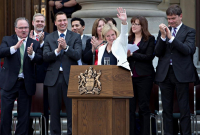Thank you for helping us meet our fundraising goal!
OTTAWA — For the first time in nearly seven years, federal, provincial and territorial leaders will gather together Monday for a meeting. They'll meet in the Canadian Museum of History in Gatineau, Que., just across the river from Parliament Hill. Here are five things to know about the summit:
What's the purpose of the meeting?
The first ministers are meeting one week before the start of the UN climate change conference in Paris, known as COP21. Newly minted prime minister Justin Trudeau has invited the premiers to accompany him as part of the Canadian delegation to the conference.
He has not had enough time since winning the Oct. 19 election to negotiate a national climate change strategy with the provinces that could be presented in Paris. So Monday's meeting is intended to show the international community that he's at least taken the first steps towards delivering on that commitment and that Canada is now serious about combating climate change after a decade in which the country was widely condemned as an environmental laggard.
Will the meeting produce new targets for reducing greenhouse gas emissions or policies for achieving them?
No. That will come later. Trudeau has promised another formal first ministers' meeting to formulate a national climate change strategy within 90 days of the Paris summit.
So what emission reduction target will Canada offer in Paris?
For the time being, the Canadian delegation will stick with the target proposed by Stephen Harper's previous Conservative government: a 30 per cent reduction below 2005 levels by 2030. Canada is on track to fall far short of the 2020 emission reduction targets it agreed to at the last international climate summit in Copenhagen in 2009 and the Harper government gave no indication how it intended to meet the 2030 target.
The new Liberal environment minister, Catherine McKenna, has said her government considers the Harper target to be the least Canada can do and is hoping to come up with something more ambitious.
Will the international community be convinced Canada has changed course if the meeting is all talk and no action?
Federal officials say other countries are prepared to cut the new Canadian government a lot of slack, believing Trudeau's heart is in the right place and appreciating that he's been prime minister for less than a month. Still, they need to see some evidence of action, particularly on Alberta's oil sands, which have turned Canada into an international environmental pariah.
On that score, Alberta Premier Rachel Notley has done some of the heavy lifting for Trudeau, unveiling Sunday a new climate policy for her province, including imposition of a carbon tax, phase-out of coal-fired power plants and a hard cap on greenhouse gas emissions from the oil sands, the country's largest emitter.
Once in Paris, Trudeau is expected to join U.S. President Barack Obama in announcing funding for clean energy research.
What else will first ministers talk about?
First ministers are also expected to discuss Trudeau's promise to bring 25,000 Syrian refugees to Canada by the end of the year. The feds' detailed plan for offering safe haven is to be released Tuesday but at least one premier, Saskatchewan's Brad Wall, has expressed concern that the federal government is trying to rush matters to meet an artificial year-end deadline. He has suggested that the government needs to take more time to ensure adequate security screening is done on all those allowed into the country.
The Canadian Press



Comments